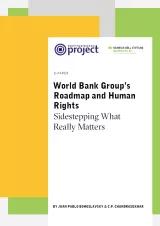World Bank Group’s Roadmap and Human Rights
This propositional paper looks at the World Bank's new roadmap to evolve its mission. As the ongoing crisis of development reveals in the myriad forms it takes, it is clear that the international community and special institutions such as the World Bank, established with the promise that they would advance global development, have failed in their mission.
Given that context, what is needed is not just “evolution” but radical reform. In this 75th year of the Universal Declaration of Human Rights, adopted by the United Nations General Assembly on Dec. 10, 1948, what stands out is that, from the perspective of low and middle-income countries, the realization of a core right enshrined in a follow-up General Assembly resolution nearly four decades later, the Right to Development, remains a distant dream. The proclamation of the right to development in 1986 emphasized the need for “constant improvement of the well-being of the entire population and of all individuals, on the basis of their active, free and meaningful participation in development and in the fair distribution of the benefits resulting therefrom.” It went on to note “that efforts at the international level to promote and protect human rights should be accompanied by efforts to establish a new international economic order.”
This propositional paper provides context for the failings of the roadmap, as well as what would need to be addressed to advance an agenda in line with the necessary, radical reforms.
Product details
Table of contents
- What the Roadmap offers: Old wine in new bottles 4
- Modest ambitions and a mere shift in focus 6
- Blurred recognition of new challenges 8
- Incorporating human rights into WBG indicators 9
- A role for hybrid indicators 10
- In summary 12
